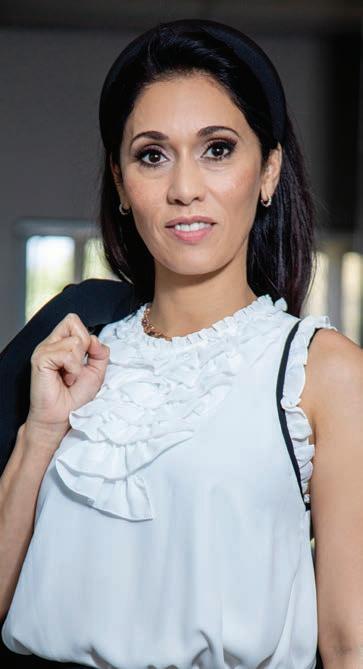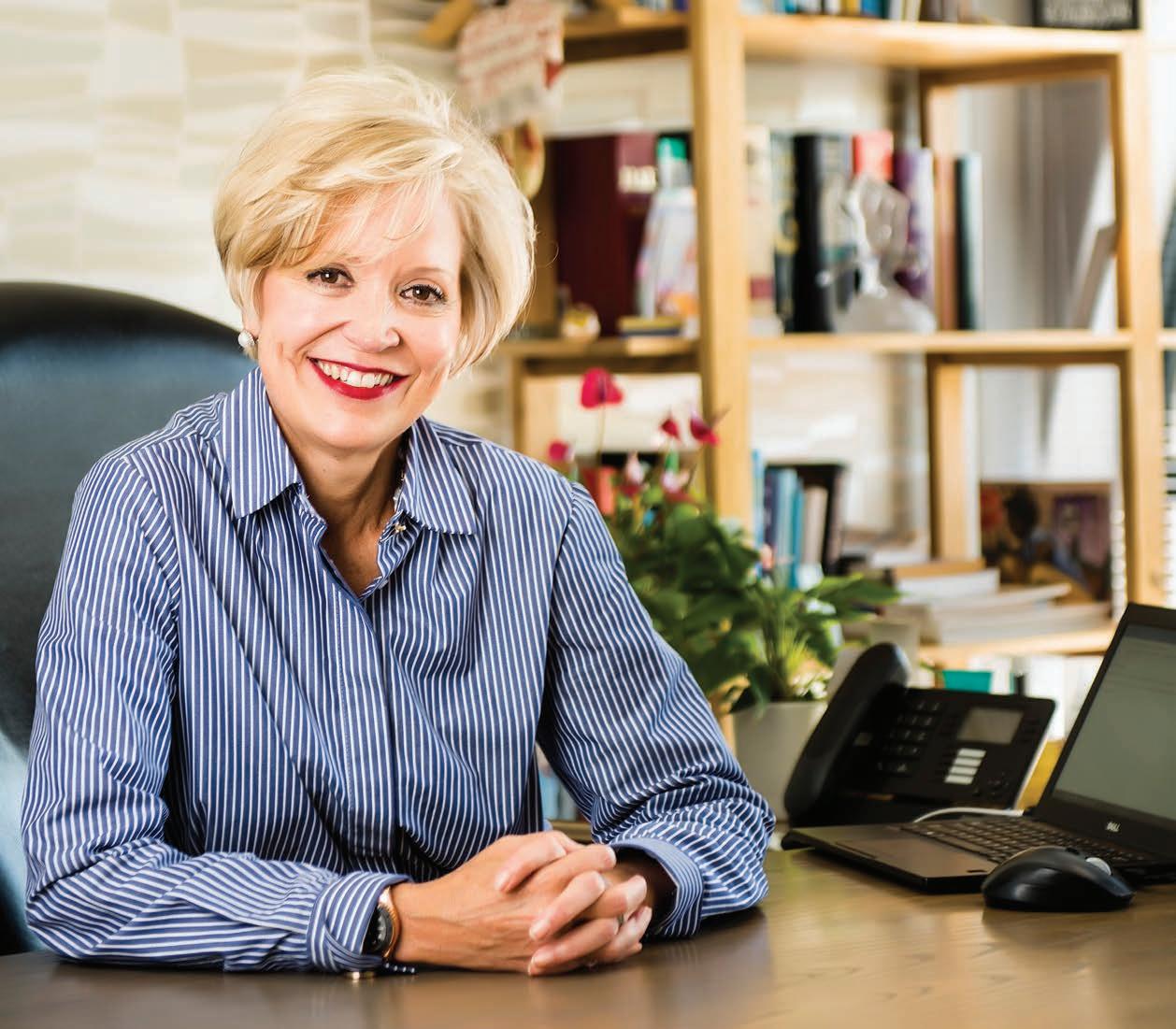
8 minute read
says Andile Nomlala Tasneem Fredericks highlights gender issues
A CALL FOR GENDER REFORM
South Africa needs to apply a robust gender lens to its policy framework, writes Tasneem Fredericks, deputy president of the Black Management Forum
Avideo doing the rounds on social media at the start of the COVID-19 pandemic moved me to both a deep sense of despair and anger. The video showed how a self-employed woman of a respectable age was loaded into the back of a police van with her goods. Her street food was confiscated by a male police officer for transgressing the level 5 lockdown regulations.
It stays with me as a stark reminder of the deep social divide and lack of protection for vulnerable women in the informal sector. This cuts across other sectors for women in general who similarly endure little to no protection in a world that remains largely patriarchal, racist, sexist, anti-LGBTQI+, anti-poor and conducive to the thriving of gender-based violence.
THE GENDER LENS
Important to note is that a gender lens does not exclude men. The focus remains on empowering women and girls, however, the conversation is extended to include men as enablers to change and to challenge socially constructed roles.
Society constantly peddles these constructs of male toxicity, unconscious bias and the power dynamic and vertical employment relations between women and men, which are reinforced through channels of education, politics, economics and cultural systems. Reform demands that we advocate for a complete overhaul of the financial, social and political system to make a real dent in the scourge of femicide and, ultimately, put cash in the hands of women.
A gender lens approach to South Africa’s policy framework will ensure that decisions around how women overcome structural barriers will bolster the success of a greater number of women participating in the economy. Women face specific challenges
Tasneem Fredericks
around entry to male-dominated industries. Entry to these areas will unlock an expanded range of products and novel services previously unimagined.
TIME TO DO THE RIGHT THING AND MAKE A SEISMIC SHIFT
The time has come to do the right and logical thing and link a strategy that supports both profit and purpose. Achieving both the bottom line and equality is not mutually exclusive, and embracing this concept should be the start of a new beginning. Reshaping the system
to incorporate the women’s agenda is a seismic shift from the rampant and common devaluation and disenfranchisement of women to one that promotes and includes the much-needed growth during and after any pandemic.
Time poverty has been an added burden for many women during COVID-19 as a consequence of working from home. This added strain has guaranteed the further exploitation of women who now had to balance work with the unpaid responsibility of teaching children now learning from home during turbulent economic times.
It was a wonderous and momentous moment when President Ramaphosa announced on 9 August 2020 that government would reserve 40 per cent of public procurement for women-owned businesses. The tone and message that this stimulus package sends are important in the fight for economic justice for women. In a country where women constantly have to defend and justify their right to a slice of the economic pie, this deliberate intervention in response to the evils of triple oppression heralds a much-needed vote of confidence from the highest office in the country.
There are many ways to transform the foundations of the existing system and the Black Management Forum recommends the following: • The implementation of deliberate measures such as set-asides, quota systems to ensure women representation in corporate South Africa. • Access to capital and debt relief with repayment schedules offered to the largely informal self-employed sector. • Training in financial literacy and industryspecific technical assistance. • Investment in infrastructure that ensures a safe and protected space for women to take public transport, trade, live and breathe. • Extending social networks, mentorship, and enhanced digitisation efforts to scale women-owned small businesses. • Lastly, there can be no delegation of agency and limits on self-determination for women.
BEING RELEVANT
What does it mean for a profession – particularly the accountancy profession – to be relevant? Chantyl Mulder CA(SA), Executive Director: Nation Building at SAICA, weighs in
Chantyl Mulder

Every professional, regardless of whether they are an engineer, lawyer, doctor or an accountant, exists to serve society.
From the onset, we believe that professionals have a duty to serve society. This stems from the fact that they are part of the elite class and in the very top echelons of leadership. And, by the nature of their positions and knowledge, it is beneficial for society to invest in their value. It may sound altruistic, but it is something I truly believe: all professionals have a noble cause to bring to bear, a noble obligation to serve society; one that does not warrant nonpayment of servitude.
For accounting professionals, particularly Chartered Accountants, this mandate goes even deeper.
In its constitution, the International Federation of Accountants (IFAC) stipulates that its mission is to serve the public’s interest. This sometimes gets forgotten. The South African Institute of Chartered Accountants (SAICA) is an institution that serves its members and regulates their behaviour, delivers talent to the economy and society and upholds standards. But, ultimately, it serves and supports members in fulfilling their duty of serving society.
SERVING OUR SOCIETY
If SAICA and its members do not serve society, the profession will lose its relevance. Some query, for example, if it’s reasonable for an accountant to serve as a chief financial officer (CFO) and have the same obligation and public duty as a public auditor? While the public auditor might certify accounts, this brings a different responsibility. In the same way as a CFO who provides information for decision-making supports the entity they serve so that it meets its responsibilities. Therefore, the entity has a responsibility to society. It has a responsibility to deliver financial or commercial returns to investors, but also must act as a responsible corporate citizen.
Speaking of responsibility, every time a financial scandal breaks, audit becomes the more visible aspect and it affects the entire profession. People always default to audit, advisory and other services.
While auditors are not part of the full SAICA membership, it is central to and where we craft our profession. It’s where all internal auditors are trained and from where all the audit committee members originate. It is the last point of defence. Whenever there is a problem in audit, we must all rally to fix it, because it is the foundation and centre of our profession. If we lose credibility, it affects everyone and we can’t distance ourselves from it. If we fix this, it will benefit all of us while providing the necessary assurance to society.
Serving society informs my sense of what SAICA should always be: inside that sweet spot of relevance where the organisation finds itself helping its members become more accustomed to what it means to serve the public interest, while also offering support
SAICA, therefore, must continue to create platforms for members to collaborate on delivering that value needed by society. It must be about dealing with the pertinent questions of our time. We are not going to be relevant if we don’t assist our members to understand their public interest responsibilities. I don’t think it is helpful for SAICA and the profession to have a narrow view of what society expects of its membership.
Ultimately, we should be aware that the profession doesn’t exist for itself – it exists to serve society.
COMMITTED TO DELIVERING GLOBAL GOALS
In 2015, world leaders gathered at the United Nations to adopt an ambitious framework of 17 Sustainable Development Goals (SDGs) and 169 associated targets to address the full range of social and economic development issues facing people around the world. These goals included finding solutions for poverty, hunger, health, education, climate change, gender equality, water, sanitation, energy, environment and social justice. When bunched up, these goals provide governments, businesses and civil society with a universal roadmap to tackle urgent challenges, to meaningfully engage with emerging risks, and discover new opportunities for creating value.
Whenever we think about the theme “a profession of national value”, the UN SDGs or nation-building, we are reminded that it is imperative to find a way to anchor all of this good work in the idea that the profession needs to be able to solve some of society’s most pressing problems. We are not going to do that by ourselves as SAICA. We can achieve this by ensuring that our members understand their public interest. Of course, making sure that they have the technical competencies they need is also important.
As the leading accountancy body in South Africa, SAICA has been calling on its members not only to “adopt” one of the SDGs, but also to show the work that our members do – in their personal and business capacity – to assist the world in reaching the SDGs by 2030. SAICA has undertaken to track how its members are contributing to a better world and showcase this in a special annual report.
As Goal 17 outlines, it is the partnershipsbased approach underpinned by collective actions that will truly see us reach the targets set in the 2030 Agenda. We are encouraged by our profession’s commitment to the SDGs. However, the commitment and actions of individuals alone are not enough to see us deliver on the global goals.
As SAICA, we have united around the SDGs to deepen the country’s understanding of the challenges, opportunities and dynamics that can be leveraged to accelerate and prioritise the delivery of the SDGs. It should be incumbent on all professionals – not just those in the accountancy profession – to rally behind these goals for the greater good of our country and our planet.
For more about SAICA and the work of its members as well as that of the greater profession in helping to achieve the SDGs by 2030, please visit www.saicasdg.co.za












